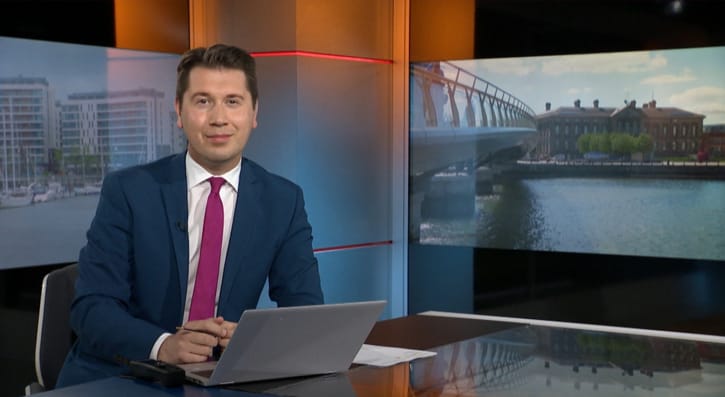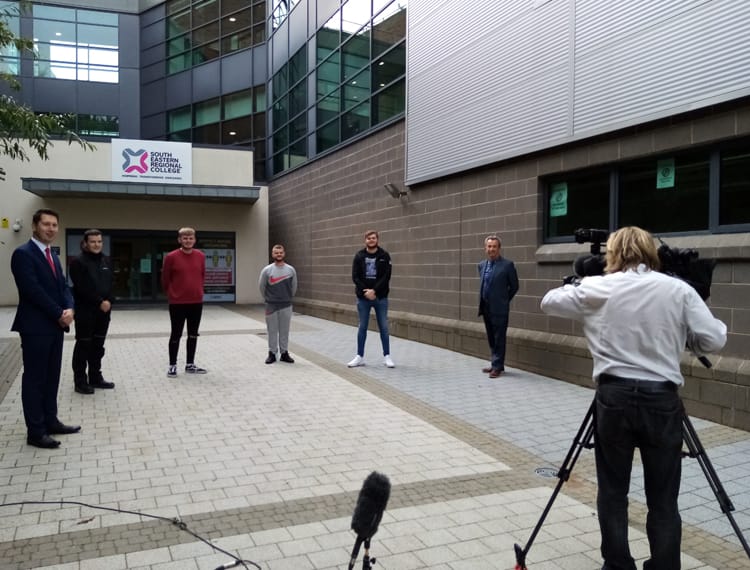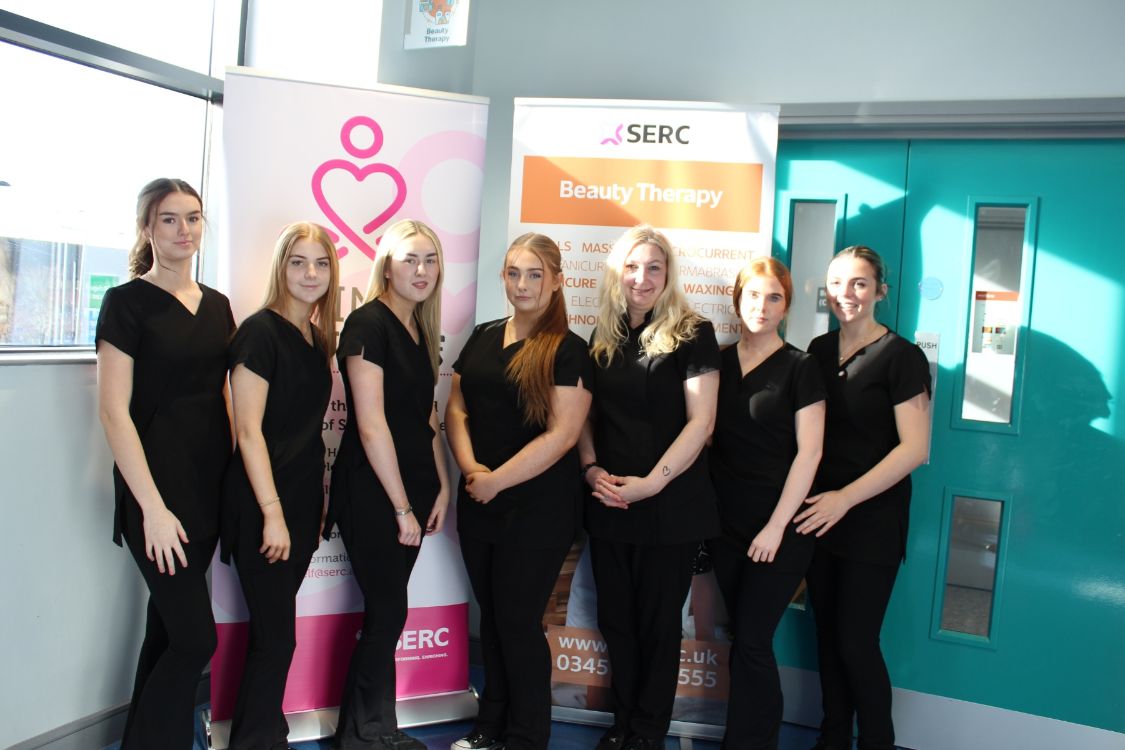How UTV's Paul Reilly got on course at SERC
0 min read
05 October 2020



Newtownards man, Paul Reilly, Broadcast Journalist at UTV, is quickly becoming a familiar face in our homes at tea time. We caught up with him to do a little interviewing of our own. Here, Paul shares how studying for his degree at South Eastern Regional College and further studies at college, proved to be the right course for him.
Tell us a little bit about yourself?
I’m 36 years old, I live with my partner and our two dogs in Newtownards. I grew up in the town and despite always thinking I’d move away, it’s drawn me back. I have two wonderful nephews and two beautiful nieces that I absolutely dote on.
Where did you go to school and what were your favourite subjects?
I was a pupil at the Newtownards Model Primary School. For most of that time I struggled academically, particularly with reading. It wasn’t until Primary Six that I received additional support and I’ll be forever grateful to Mrs Kennedy for her patience. While school work was sometimes difficult I really enjoyed drama and performing. I also made friends for life. Aftering “failing” my 11plus I studied at Scrabo High School for just under two years before it closed. It was a fantastic experience and I’ll challenge anyone who criticises the school. The encouragement I received from the teaching staff and the confidence I gained was invaluable. I completed my secondary education and Sixth Form at Glastry College in Ballyhalbert. I absolutely loved my time at Glastry and it was an honour to be asked back to speak at their prize night a number of years ago. I left with 9 GCSEs and 2 Vocational A-Levels in Business Studies.
Did you have any career ambitions when you were at school?
From as early as I can remember I wanted to read the news on TV. My mum tells people that I used to sit at a little desk as a 5 year old and blather away! Despite working as hard as I could at school, doing that job seemed like a distant dream.
Tell us a little bit about your educational route - what you did following your GCSEs and why you came to study at SERC (formerly North Down and Ards Institute)? Tell us what you studied and why you chose that course?
I was delighted to be able to study Sixth Form at Glastry. The school previously offered GNVQs but I was in the first year of Vocational A-Levels. One of my best subjects at GCSE was Business Studies so I took up a double A Level in that. For whatever reason, I chose not to complete a UCAS application (despite being Deputy Head Boy!). I think I found it all rather daunting and wobbled a bit. Thankfully, my head of Sixth Form Mrs Ross took me to one side and asked me to at least apply to ‘tech’ and suggested the HND in Business at North Down and Ards Institute, now SERC. I think I found it less intimidating. I honestly don’t believe I would have been suited to a ‘normal’ university environment.
What did you enjoy most about the course/being at college?
In Sixth Form I did a week’s work experience at UTV. The one piece of advice I took away from that time was to get a degree in any subject other than media. I suppose that had stuck with me when I went to college. I felt the HND at SERC was a natural progression from my A Levels and the classroom set-up was comfortable. The lecturers were approachable and in many cases were people who had worked in business. It was a no brainer to enter the second year of the BA Hons in Business Administration after graduating with my diploma. There was a running joke in the class that some elements such as Excel spreadsheets of profit and loss accounts would be no use to me when I would be reading the news on TV. The dream was still very much alive. My parents were so proud when I graduated with a 2:1 degree, one of the first in my family to do so, but I still wasn’t sure what step to take next.
What did you do after your degree at SERC?
It was by chance that my friend Ashley and I were in Castle Court shopping centre and met someone on a Belfast Met pop-up stand. We got chatting and I asked them about studying journalism. They told me all about the NVQ Level 4 and I did more research. Unfortunately I was too late for that September’s intake after leaving SERC. When the following September came round I was bursting with excitement. I enjoyed every aspect of the course, even learning shorthand! The work placement at the Belfast Telegraph during the second term was a huge step and opened up freelance opportunities for me. 2007 though was not a great year to be looking for employment but I was very fortunate. Before I’d completed the qualification I secured part time work in a publishing house with the promise of a full time job once I’d completed my course. I spent almost two year writing for trade publications and websites. Then I took a shot in the dark and applied for a job at GMTV’s Belfast bureau. Essentially I thought it would be good for interview experience. I was put through my paces by Michael Macmillan, a former senior BBC correspondent. He pretty much took a chance on a very keen and enthusiastic 25 year old and I’ll be eternally grateful for that. The next couple of years went by in a blur. I was taught to self shoot, covered major stories for the network programme and regularly read the local news. It was a dream come true but a steep learning curve. When the local breakfast TV contract was taken back by UTV I moved with it into the Havelock House newsroom. An incredibly daunting moment. Suddenly I was working with people I’d watched on TV as a boy. I’ve been very lucky over the last decade to tell some important stories and to sit in the anchor’s chair on UTV Live at Six. I’ve also presented programmes including UTV at the Balmoral show as well as reporting live for the ITV national news.
What advice would you give to someone wishing to work in a similar role?
Honestly, my biggest fear was that the industry would be cut throat and elitist. Those are total misconceptions. Don’t underestimate hard work and remember that journalism is a people job. It’s about building relationships, gaining people’s trust and showing compassion. Your own background and life experiences are really important. Journalists are not a homogeneous group of people. We need variety and diversity, because journalism and broadcasting has to be representative of society.
Any role models, mentors or advice that has helped you on your way?
So many role models along the way, in school it was people like my English teacher Mrs McGrugan, who really encouraged Talking and Listening projects in class. This gave me more confidence to stand up and speak in front of people. Professionally Michael Macmillan and the opportunities he gave me in broadcasting were incredible. Today, even a decade working in television, I still learn so much from my UTV colleagues. I suppose looking back, the lectures at SERC, who I’m sure sometimes were scratching their heads about what to do with me, still kept me on the right track. They provided so much support to help me gain qualifications that if I didn’t have, I really don’t know if I’d be doing the job I love today.
To find out more information on SERC's business courses, click here
Page Tags
SERCLatest News
Keep up with the latest from SERC



